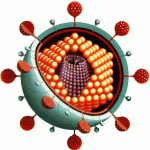Virology
|
22 january 2013 11:15:09 |
| Ability to cause erythema migrans differs between Borrelia burgdorferi sensu lato isolates (Parasites & Vectors) |
|
Tweet Background:
Lyme borreliosis is a tick-borne disease caused by Borrelia burgdorferi sensu lato. The variety of characteristic and non-specific clinical manifestations is partially explained by its genetic diversity. We investigated the ability of B. burgdorferi sl isolates to cause erythema migrans.
Methods:
The genetic constellation of isolates from ticks was compared to isolates found in erythema migrans. PCR and sequence analysis was performed on the plasmid-encoded ospC and the chromosomal 5S-23S rDNA spacer region (IGS).
Results:
Seven different B. burgdorferi sl genospecies were identified in 152 borrelia isolates from ticks and erythema migrans biopsies. B afzelii (51%) and B. garinii (27%) were the most common in ticks. From the 44 sequences obtained from erythema migrans samples 42 were B. afzelii, one B. garinii and one B. bavariensis. Significant associations with erythema migrans formation were found for four IGS and two ospC types. Five from forty-five ospC types were associated with more than one genospecies.
Conclusions:
B. burgdorferi sl isolates differ in their propensity to cause erythema migrans. These differences were also found within genospecies. In other words, although B. afzelii was mostly associated with erythema migrans, some B. afzelii isolates had a low ability to cause erythema migrans. Our data further support the occurrence of plasmid exchange between borrelia genospecies under natural conditions. |
| 94 viewsCategory: Epidemiology, Microbiology, Virology |
 Expression of trypsin modulating oostatic factor (TMOF) in an entomopathogenic fungus increases its virulence towards Anopheles gambiae and reduces fecundity in the target mosquito (Parasites & Vectors) Expression of trypsin modulating oostatic factor (TMOF) in an entomopathogenic fungus increases its virulence towards Anopheles gambiae and reduces fecundity in the target mosquito (Parasites & Vectors)Identification and characterization of microRNAs in the pancreatic fluke Eurytrema pancreaticum (Parasites & Vectors) 
|
| blog comments powered by Disqus |
MyJournals.org
The latest issues of all your favorite science journals on one page
The latest issues of all your favorite science journals on one page



